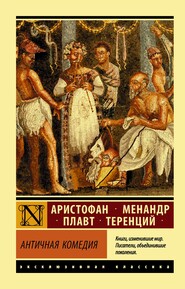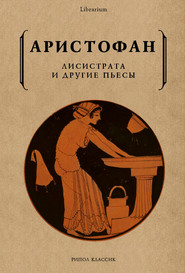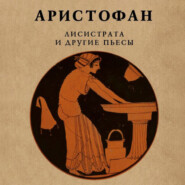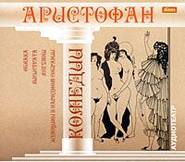По всем вопросам обращайтесь на: info@litportal.ru
(©) 2003-2024.
✖
The Eleven Comedies, Volume 2
Автор
Год написания книги
2018
Настройки чтения
Размер шрифта
Высота строк
Поля
BDELYCLEON. In the name of the gods! withdraw or we shall fight you the whole day long.
CHORUS. No, not as long as I retain an atom of breath. Ha! your desire is to tyrannize over us!
BDELYCLEON. Everything is now tyranny with us, no matter what is concerned, whether it be large or small. Tyranny! I have not heard the word mentioned once in fifty years, and now it is more common than salt-fish, the word is even current on the market. If you are buying gurnards and don't want anchovies, the huckster next door, who is selling the latter, at once exclaims, "That is a man, whose kitchen savours of tyranny!" If you ask for onions to season your fish, the green-stuff woman winks one eye and asks, "Ha! you ask for onions! are you seeking to tyrannize, or do you think that Athens must pay you your seasonings as a tribute?"
XANTHIAS. Yesterday I went to see a gay girl about noon and suggested she should mount and ride me; she flew into a rage, pretending I wanted to restore the tyranny of Hippias.[63 - This 'figure of love'—woman atop of the man—is known in Greek as [Greek: hippos] (Latin equus, 'the horse'); note the play upon words with the name Hippias.]
BDELYCLEON. That's the talk that pleases the people! As for myself, I want my father to lead a joyous life like Morychus[64 - A tragic poet, who was a great lover of good cheer, it appears.] instead of going away before dawn to basely calumniate and condemn; and for this I am accused of conspiracy and tyrannical practice!
PHILOCLEON. And quite right too, by Zeus! The most exquisite dishes do not make up to me for the life of which you deprive me. I scorn your red mullet and your eels, and would far rather eat a nice little law suitlet cooked in the pot.
BDELYCLEON. 'Tis because you have got used to seeking your pleasure in it; but if you will agree to keep silence and hear me, I think I could persuade you that you deceive yourself altogether.
PHILOCLEON. I deceive myself, when I am judging?
BDELYCLEON. You do not see that you are the laughing-stock of these men, whom you are ready to worship. You are their slave and do not know it.
PHILOCLEON. I a slave, I, who lord it over all!
BDELYCLEON. Not at all, you think you are ruling when you are only obeying. Tell me, father, what do you get out of the tribute paid by so many Greek towns?
PHILOCLEON. Much, and I appoint my colleagues jurymen.
BDELYCLEON. And I also. Release him, all of you, and bring me a sword. If my arguments do not prevail I will fall upon this blade. As for you, tell me whether you accept the verdict of the Court.
PHILOCLEON. May I never drink my Heliast's pay in honour of the good Genius, if I do not.
CHORUS. Tis now we have to draw upon our arsenal for some fresh weapon; above all do not side with this youth in his opinions. You see how serious the question has become; 'twill be all over with us, which the gods forfend, if he should prevail.
BDELYCLEON. Let someone bring me my tablets with all speed!
CHORUS. Your tablets? Ha, ha! what an importance you would fain assume!
BDELYCLEON. I merely wish to note down my father's points.
PHILOCLEON. But what will you say of it, if he should triumph in the debate?
CHORUS. That old men are no longer good for anything; we shall be perpetually laughed at in the streets, shall be called thallophores,[65 - Old men, who carried olive branches in the processions of the Panathenaea. Those whose great age or infirmity forbade their being used for any other purpose were thus employed.] mere brief-bags. You are to be the champion of all our rights and sovereignty. Come, take courage! Bring into action all the resources of your wit.
PHILOCLEON. At the outset I will prove to you that there exists no king whose might is greater than ours. Is there a pleasure, a blessing comparable with that of a juryman? Is there a being who lives more in the midst of delights, who is more feared, aged though he be? From the moment I leave my bed, men of power, the most illustrious in the city, await me at the bar of the tribunal; the moment I am seen from the greatest distance, they come forward to offer me a gentle hand,—that has pilfered the public funds; they entreat me, bowing right low and with a piteous voice, "Oh! father," they say, "pity me, I adjure you by the profit you were able to make in the public service or in the army, when dealing with the victuals." Why, the man who thus speaks would not know of my existence, had I not let him off on some former occasion.
BDELYCLEON. Let us note this first point, the supplicants.
PHILOCLEON. These entreaties have appeased my wrath, and I enter—firmly resolved to do nothing that I have promised. Nevertheless I listen to the accused. Oh! what tricks to secure acquittal! Ah! there is no form of flattery that is not addressed to the heliast! Some groan over their poverty and they exaggerate the truth in order to make their troubles equal to my own. Others tell us anecdotes or some comic story from Aesop. Others, again, cut jokes; they fancy I shall be appeased if I laugh. If we are not even then won over, why, then they drag forward their young children by the hand, both boys and girls, who prostrate themselves and whine with one accord, and then the father, trembling as if before a god, beseeches me not to condemn him out of pity for them, "If you love the voice of the lamb, have pity on my son's"; and because I am fond of little sows,[66 - An obscene pun. [Greek: Choiros] means both a sow and the female organ.] I must yield to his daughter's prayers. Then we relax the heat of our wrath a little for him. Is not this great power indeed, which allows even wealth to be disdained?
BDELYCLEON. A second point to note, the disdain of wealth. And now recall to me what are the advantages you enjoy, you, who pretend to rule over Greece?
PHILOCLEON. Being entrusted with the inspection of the young men, we have a right to examine their organs. Is Aeagrus[67 - A celebrated actor.] accused, he is not acquitted before he has recited a passage from 'Niobe'[68 - There were two tragedies named 'Niobé,' one by Aeschylus and the other by Sophocles, both now lost.] and he chooses the finest. If a flute-player gains his case, he adjusts his mouth-strap[69 - A double strap, which flute-players applied to their lips and was said to give softness to the tones.] in return and plays us the final air while we are leaving. A father on his death-bed names some husband for his daughter, who is his sole heir; but we care little for his will or for the shell so solemnly placed over the seal;[70 - The shell was fixed over the seal to protect it.] we give the young maiden to him who has best known how to secure our favour. Name me another duty that is so important and so irresponsible.
BDELYCLEON. Aye, 'tis a fine privilege, and the only one on which I can congratulate you; but surely to violate the will is to act badly towards the heiress.
PHILOCLEON. And if the Senate and the people have trouble in deciding some important case, it is decreed to send the culprits before the heliasts; then Euathlus[71 - A calumniator and a traitor (see 'The Acharnians').] and the illustrious Colaconymus,[72 - Cleonymus, whose name the poet modifies, so as to introduce the idea of a flatterer ([Greek: kolax]).] who cast away his shield, swear not to betray us and to fight for the people. Did ever an orator carry the day with his opinion if he had not first declared that the jury should be dismissed for the day as soon as they had given their first verdict? We are the only ones whom Cleon, the great bawler, does not badger. On the contrary, he protects and caresses us; he keeps off the flies, which is what you have never done for your father. Theorus, who is a man not less illustrious than Euphemius,[73 - Another flatterer, a creature of Cleon's.] takes the sponge out of the pot and blacks our shoes. See then what good things you deprive and despoil me of. Pray, is this obeying or being a slave, as you pretended to be able to prove?
BDELYCLEON. Talk away to your heart's content; you must come to a stop at last and then you shall see that this grand power only resembles one of those things that, wash 'em as you will, remain as foul as ever.
PHILOCLEON. But I am forgetting the most pleasing thing of all. When I return home with my pay, everyone runs to greet me because of my money. First my daughter bathes me, anoints my feet, stoops to kiss me and, while she is calling me "her dearest father," fishes out my triobolus with her tongue;[74 - Athenian poor, having no purse, would put small coins into mouth for safety. We know that the triobolus was the daily of the judges. Its value was about 4-1/2 d.] then my little wife comes to wheedle me and brings a nice light cake; she sits beside me and entreats me in a thousand ways, "Do take this now; do have some more." All this delights me hugely, and I have no need to turn towards you or the steward to know when it shall please him to serve my dinner, all the while cursing and grumbling. But if he does not quickly knead my cake, I have this,[75 - A jar of wine, which he had bought with his pay.] which is my defence, my shield against all ills. If you do not pour me out drink, I have brought this long-eared jar[76 - A jar with two long ears or handles, in this way resembling an ass.] full of wine. How it brays, when I bend back and bury its neck in my mouth! What terrible and noisy gurglings, and how I laugh at your wine-skins. As to power, am I not equal to the king of the gods? If our assembly is noisy, all say as they pass, "Great gods! the tribunal is rolling out its thunder!" If I let loose the lightning, the richest, aye, the noblest are half dead with fright and shit themselves with terror. You yourself are afraid of me, yea, by Demeter! you are afraid.
BDELYCLEON. May I die if you frighten me.
CHORUS. Never have I heard speech so elegant or so sensible.
PHILOCLEON. Ah! he thought he had only to turn me round his finger; he should, however, have known the vigour of my eloquence.
CHORUS. He has said everything without omission. I felt myself grow taller while I listened to him. Methought myself meting out justice in the Islands of the Blest, so much was I taken with the charm of his words.
BDELYCLEON. How overjoyed they are! What extravagant delight! Ah! ah! you are going to get a thrashing to-day.
CHORUS. Come, plot everything you can to beat him; 'tis not easy to soften me if you do not talk on my side, and if you have nothing but nonsense to spout, 'tis time to buy a good millstone, freshly cut withal, to crush my anger.
BDELYCLEON. The cure of a disease, so inveterate and so widespread in Athens, is a difficult task and of too great importance for the scope of Comedy. Nevertheless, my old father….
PHILOCLEON. Cease to call me by that name, for, if you do not prove me a slave and that quickly too, you must die by my hand, even if I must be deprived of my share in the sacred feasts.
BDELYCLEON. Listen to me, dear little father, unruffle that frowning brow and reckon, you can do so without trouble, not with pebbles, but on your fingers, what is the sum-total of the tribute paid by the allied towns; besides this we have the direct imposts, a mass of percentage dues, the fees of the courts of justice, the produce from the mines, the markets, the harbours, the public lands and the confiscations. All these together amount to close on two thousand talents. Take from this sum the annual pay of the dicasts; they number six thousand, and there have never been more in this town; so therefore it is one hundred and fifty talents that come to you.
PHILOCLEON. What! our pay is not even a tithe of the State revenue?
BDELYCLEON. Why no, certainly not.
PHILOCLEON. And where does the rest go then?
BDELYCLEON. To those who say: "I shall never betray the interests of the masses; I shall always fight for the people." And 'tis you, father, who let yourself be caught with their fine talk, who give them all power over yourself. They are the men who extort fifty talents at a time by threat and intimidation from the allies. "Pay tribute to me," they say, "or I shall loose the lightning on your town and destroy it." And you, you are content to gnaw the crumbs of your own might. What do the allies do? They see that the Athenian mob lives on the tribunal in niggard and miserable fashion, and they count you for nothing, for not more than the vote of Connus;[77 - A well-known flute-player.] 'tis on those wretches that they lavish everything, dishes of salt fish, wine, tapestries, cheese, honey, sesame-fruit, cushions, flagons, rich clothing, chaplets, necklets, drinking-cups, all that yields pleasure and health. And you, their master, to you as a reward for all your toil both on land and sea, nothing is given, not even a clove of garlic to eat with your little fish.
PHILOCLEON. No, undoubtedly not; I have had to send and buy some from Eucharides. But you told me I was a slave. Prove it then, for I am dying with impatience.
BDELYCLEON. Is it not the worst of all slaveries to see all these wretches and their flatterers, whom they gorge with gold, at the head of affairs? As for you, you are content with the three obols they give you and which you have so painfully earned in the galleys, in battles and sieges. But what I stomach least is that you go to sit on the tribunal by order. Some lewd stripling, the son of Chereas, to wit, enters your house balancing his body, rotten with debauchery, on his straddling legs and charges you to come and judge at daybreak, and precisely to the minute. "He who only presents himself after the opening of the Court," says he, "will not get the triobolus." But he himself, though he arrives late, will nevertheless get his drachma as a public advocate. If an accused man makes him some present, he shares it with a colleague and the pair agree to arrange the matter like two sawyers, one of whom pulls and the other pushes. As for you, you have only eyes for the public pay-clerk, and you see nothing.
PHILOCLEON. Can it be I am treated thus? Oh! what is it you are saying? You stir me to the bottom of my heart! I am all ears! I cannot syllable what I feel.
BDELYCLEON. Consider then; you might be rich, both you and all the others; I know not why you let yourself be fooled by these folk who call themselves the people's friends. A myriad of towns obey you, from the Euxine to Sardis. What do you gain thereby? Nothing but this miserable pay, and even that is like the oil with which the flock of wool is impregnated and is doled to you drop by drop, just enough to keep you from dying of hunger. They want you to be poor, and I will tell you why. 'Tis so that you may know only those who nourish you, and so that, if it pleases them to loose you against one of their foes, you shall leap upon him with fury. If they wished to assure the well-being of the people, nothing would be easier for them. We have now a thousand towns that pay us tribute; let them command each of these to feed twenty Athenians; then twenty thousand of our citizens would be eating nothing but hare, would drink nothing but the purest of milk, and always crowned with garlands, would be enjoying the delights to which the great name of their country and the trophies of Marathon give them the right; whereas to-day you are like the hired labourers who gather the olives; you follow him who pays you.
PHILOCLEON. Alas! my hand is benumbed; I can no longer draw my sword.[78 - We have already seen that when accepting his son's challenge he swore to fall upon his sword if defeated in the debate.]
What has become of my strength?
BDELYCLEON. When they are afraid, they promise to divide Euboea[79 - Pericles had first introduced the custom of sending poor citizens, among whom the land was divided, into the conquered countries. The island of Aegina had been mainly divided in this way among Athenian colonists.] among you and to give each fifty bushels of wheat, but what have they given you? Nothing excepting, quite recently, five bushels of barley, and even these you have only obtained with great difficulty, on proving you were not aliens, and then choenix by choenix.[80 - The choenix was a measure corresponding to our quart.] That is why I always kept you shut in; I wanted you to be fed by me and no longer at the beck of these blustering braggarts. Even now I am ready to let you have all you want, provided you no longer let yourself be suckled by the pay-clerk.
CHORUS. He was right who said, "Decide nothing till you have heard both sides," for it seems to me, that 'tis you who now gain the complete victory. My wrath is appeased, I throw away my sticks. Come, comrade, our contemporary, let yourself be gained over by his words; come, do not be too obstinate or too perverse. Why have I no relation, no ally to speak to me like this? Do not doubt it, 'tis a god who is now protecting you and loading you with his benefits. Accept them.











